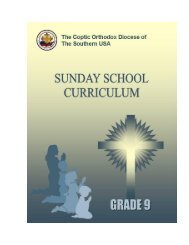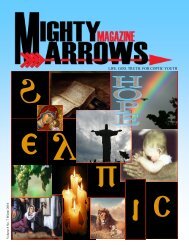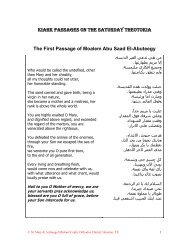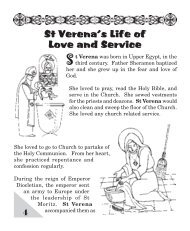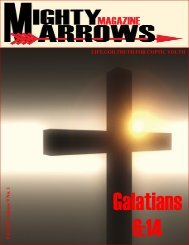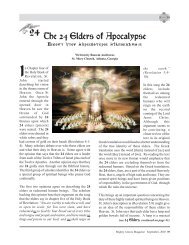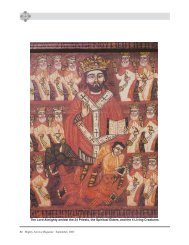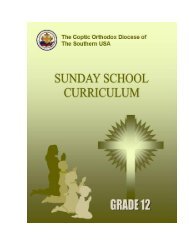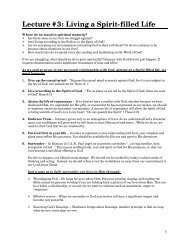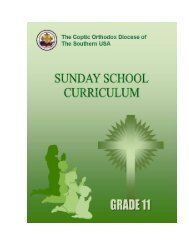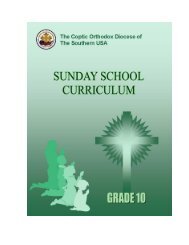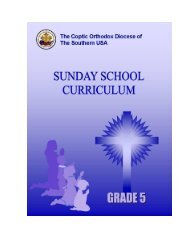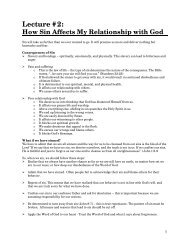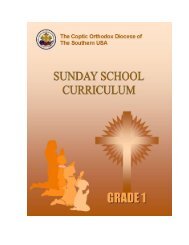Studies in Patrology III Written by: Dr Medhat Ibrahim Seminarian ...
Studies in Patrology III Written by: Dr Medhat Ibrahim Seminarian ...
Studies in Patrology III Written by: Dr Medhat Ibrahim Seminarian ...
Create successful ePaper yourself
Turn your PDF publications into a flip-book with our unique Google optimized e-Paper software.
<strong>Studies</strong> <strong>in</strong> <strong>Patrology</strong> <strong>III</strong><br />
<strong>Written</strong> <strong>by</strong>: <strong>Dr</strong> <strong>Medhat</strong> <strong>Ibrahim</strong><br />
Sem<strong>in</strong>arian Deacon, Theological College, El-M<strong>in</strong>a, Egypt<br />
A sa<strong>in</strong>t once said, “Without the early church fathers and their teach<strong>in</strong>gs and suffer<strong>in</strong>gs we would not have<br />
the same one true faith shared <strong>by</strong> the chosen Apostles which was orig<strong>in</strong>ally taken from the Lord Jesus<br />
Christ.<br />
I. The Role of the Church Fathers <strong>in</strong> Orthodox Education:<br />
The Christian Orthodox education, especially Dogma’s and moral behavior, is challeng<strong>in</strong>g and yet<br />
so vital.<br />
Therefore, we see these Church Fathers impart<strong>in</strong>g knowledge extensively <strong>in</strong> Orthodox education<br />
that still rema<strong>in</strong>s unchanged and has been the corner stone of Christian Dogma throughout the<br />
centuries. Father George Florofsky, who is one of the great <strong>Patrology</strong> scholars, said that the study<br />
of the Church Fathers is not simply the history of Christian writ<strong>in</strong>gs but is the science of<br />
Patrological Theology. The Orthodox education established <strong>by</strong> the early Fathers reflects the truth<br />
that is derived from the Holy Gospel and the pure and holy life to which all church members aspire.<br />
The Church Fathers are not the True Light but reflected the Light of Truth <strong>in</strong> their teach<strong>in</strong>gs to<br />
further understand<strong>in</strong>g and to dim<strong>in</strong>ish rational doubt<strong>in</strong>g. St Paul, the Apostle, prophesied<br />
concern<strong>in</strong>g the role of the Church Fathers. “And with joy give thanks to the Father, who has made<br />
you fir to have your share of what God has reserved for His people <strong>in</strong> the K<strong>in</strong>gdom of Light.”<br />
(Colossians 1:12)<br />
II.<br />
The Role of the Church Fathers’ <strong>in</strong> Correct Interpretation of God’s Holy Word:<br />
In the Second Holy Epistle of St Peter, the Apostle, (3:16), he expla<strong>in</strong>s that there are some difficult<br />
th<strong>in</strong>gs which ignorant and unstable people expla<strong>in</strong> falsely, so they br<strong>in</strong>g on their own destruction.<br />
Throughout the years, some ignorant and illiterate people expla<strong>in</strong>ed some Holy Gospel verses<br />
wrong. However, we through our Church Fathers have ma<strong>in</strong>ta<strong>in</strong>ed the True Faith and correct<br />
explanation/<strong>in</strong>terpretation of all the Holy Bible Books. Much of the early Church Fathers’ writ<strong>in</strong>gs<br />
centered on expla<strong>in</strong><strong>in</strong>g scripture found with<strong>in</strong> the Holy Bible and how those verses were applicable<br />
to the believer’s life. Through the early Church Fathers we are blessed with explanations and<br />
mean<strong>in</strong>gs spiritually and literally for all the Holy Books of the Bible.<br />
St Basil, the Great, said, “<strong>in</strong> the Church Fathers explanations of the Holy Bible we will f<strong>in</strong>d an<br />
understandable explanation which may be mystical, physical, or spiritual. We will f<strong>in</strong>d these holy<br />
explanations assist to raise our hearts and m<strong>in</strong>ds to God and help us grow spiritually.”<br />
Truly, we have Fathers who specialized <strong>in</strong> writ<strong>in</strong>g <strong>in</strong>terpretations of the Holy Bible such as St<br />
Athansius, the Apostolic (expla<strong>in</strong>ed the Holy Book of Psalms), St John Chrysostom (every Holy<br />
Book of the Gospels), St August<strong>in</strong>e and so on.<br />
<strong>III</strong>. The Role of the Church Fathers’ <strong>in</strong> Teach<strong>in</strong>g About Daily Behavior:<br />
Our faithful Church Fathers wrote their teach<strong>in</strong>gs, letters, books, defenses, and recorded m<strong>in</strong>istry <strong>in</strong><br />
response to the urgent needs of the believers at their time. The early writ<strong>in</strong>gs were the response and<br />
reflected the needs characteristic of personal problems and an ever-chang<strong>in</strong>g community. In their
writ<strong>in</strong>gs we have teach<strong>in</strong>gs related to problems and solutions given for these problems. Problems<br />
were addressed based on how they affected ones’ spiritual life and growth.<br />
Such problems as richness and materialism were identified. St Clement, the Alexandrian, wrote a<br />
lengthy manuscript “Does the Rich Man Have Salvation? How? The scholar Tertullian, from North<br />
Africa, ardently believed and wrote that patience and pray<strong>in</strong>g were the holy means that connected us<br />
to the Lord. He further wrote that believers should absta<strong>in</strong> from fun and types of enterta<strong>in</strong>ment,<br />
which took ones’ focus away from God. He addressed such issues as how the Christian woman<br />
should dress.<br />
St Gregorian, the Theologian, wrote regard<strong>in</strong>g such selected topics as “deny<strong>in</strong>g the Lord Jesus<br />
Christ as a result of fear and societal pressure. St Athansius, the Apostolic, wrote about the<br />
Incarnation. St Basil, the Great, wrote to the youth of his day encourag<strong>in</strong>g them to read and study<br />
Greek literature, anger, drunkenness, envy, and humbleness.<br />
St Gregorian, the Nicean, completed the manuscript of St Basil concern<strong>in</strong>g the “Creation of Man”,<br />
and “The Luck, The Understand<strong>in</strong>g, The Knowledge and Death of Children.”<br />
St John Chrysostom wrote <strong>in</strong> detail regard<strong>in</strong>g the priesthood and repentance. Also St John wrote<br />
about mental th<strong>in</strong>k<strong>in</strong>g and concentration on the pure holy life. He offered his advice to young<br />
widows, <strong>in</strong>structed parents on the rais<strong>in</strong>g of children, and wrote about ext<strong>in</strong>guish<strong>in</strong>g materialism and<br />
squander<strong>in</strong>g ones’ life. F<strong>in</strong>ally, St John Chrysostom addressed how marital couples should live life<br />
together <strong>in</strong> a pure and holy manner.<br />
St Isozorus, the Piliosomy, wrote about two thousand messages center<strong>in</strong>g on such topics as dress<strong>in</strong>g,<br />
hospitality, humbleness, luck, lusts, and the life of hol<strong>in</strong>ess. He wrote for soldiers, teachers,<br />
scholars, politicians, physicians’ k<strong>in</strong>gs, monks and priests. St Isozorus was the spiritual father for<br />
many thousands of people, among them St Cyril the Great.<br />
St Ambrosios authored topics concern<strong>in</strong>g those ord<strong>in</strong>ated for the holy services. St August<strong>in</strong>e wrote<br />
about the eternal life of man, the scholars, and the useful works of the monks.<br />
All the above-mentioned authors and topics are not <strong>in</strong>clusive but are a select few. Their writ<strong>in</strong>gs<br />
reflect the richness of their teach<strong>in</strong>gs that have transcended time and place. Indeed they show us the<br />
way for meet<strong>in</strong>g the Lord.<br />
IV. The Fathers and Orthodox Spirituality:<br />
For man to spiritually live accord<strong>in</strong>g to God’s law and be close to God is not easy. To accomplish a<br />
truly spiritual life man needs teachers, scholars, advisors, tra<strong>in</strong>ers, and counselors. The Church<br />
Fathers were not just literal or theoretical such as Aflaton and other non-Christian philosophers, but<br />
they offered the mystical life, which <strong>in</strong>cluded the holy pure means of connect<strong>in</strong>g man to God on the<br />
basis of pure love to God.<br />
The Church Fathers offered the mystical life beyond the literacy, theory, or feel<strong>in</strong>gs. In addition,<br />
they offered through the spiritual, peace through the mystical life that began from the Light and<br />
ended <strong>in</strong> Div<strong>in</strong>e Love. This mystical life rema<strong>in</strong>s a cont<strong>in</strong>ual renewal; it is the hol<strong>in</strong>ess of the spirit<br />
<strong>in</strong> truth (John 17:17).<br />
So the role of the Church Fathers <strong>in</strong> our spiritual life can be summarized as:
1. The goal of our Christian life is to be one with God. This goal’s objective is to share <strong>in</strong> the<br />
Div<strong>in</strong>e Nature, “In this way He has given us the very great and precious gifts He promised, so<br />
that <strong>by</strong> means of these gifts you may escape from the destructive lust that is <strong>in</strong> the world and<br />
may come to share the Div<strong>in</strong>e Nature.” (II Peter 1:4) This goal may be found <strong>in</strong> the entire<br />
Fathers’ writ<strong>in</strong>gs as mentioned <strong>by</strong> St Athanasius, the Apostolic. God’s Son became mans’ Son<br />
to make everyone sons of God <strong>by</strong> His Grace.<br />
2. The shar<strong>in</strong>g of the Div<strong>in</strong>e Nature cannot be achieved <strong>by</strong> our own human wills on trial. The Holy<br />
Grace is the fundamental and the basic pr<strong>in</strong>cipal <strong>in</strong> renew<strong>in</strong>g and correction of our lives. “We<br />
believe and are saved <strong>by</strong> the Grace of the Lord Jesus Christ, just as they are.” (Acts 15:11). All<br />
Apostolic Fathers and their children such as St John Chrysostom, the scholar Clement the<br />
Alexandrian, St Ephraim the Syrian, and many others taught the same pr<strong>in</strong>cipal—we as humans<br />
should chose the hol<strong>in</strong>ess first and then Grace will complete us <strong>in</strong> a way deemed necessary for<br />
us. St John Chrysostom said, “God doesn’t work beyond our will to preserve our freedom,<br />
otherwise our freedom will be destroyed.”<br />
3. The spiritual life cannot be achieved without prayer. The Church Fathers’ prayers were a<br />
cont<strong>in</strong>uous conversation with God. Prayers were recited with joy. The Church Fathers prayers<br />
can direct us to <strong>in</strong>ternal perfect peace and deep spiritual joy. St John said, “The words of deep<br />
pure prayer are like the fire you ignite before God.”<br />
4. The Christian must partake <strong>in</strong> the Church Mysteries. This must be spiritual not simply ritual.<br />
The Fathers considered the Church’s Mysteries as a liv<strong>in</strong>g and cont<strong>in</strong>uous work and not only<br />
ritual work. We do not encounter mean<strong>in</strong>gless symbols but spiritual liv<strong>in</strong>g work, which leads us<br />
to the Div<strong>in</strong>e Nature.<br />
5. Spiritual life cannot be completed with shar<strong>in</strong>g the sa<strong>in</strong>ts—those sa<strong>in</strong>ts were not theory creators<br />
about faith but they lived out this faith on a daily basis. We can consider the sa<strong>in</strong>ts our personal<br />
teachers, counselors, and advisors as they lived before us and lived <strong>in</strong> this world but the world<br />
did not live with<strong>in</strong> them. Faith without works and works without faith are not acceptable <strong>in</strong> our<br />
beloved Church. Therefore each and every Christian should work and suffer, “So that we may<br />
share His Hol<strong>in</strong>ess.” (Hebrews 12:10)<br />
V. The Role of the Church Fathers’ <strong>in</strong> Religious Rais<strong>in</strong>g:<br />
In the Orthodox Church there is no dist<strong>in</strong>ction between religious rais<strong>in</strong>g and the so-called secular<br />
rais<strong>in</strong>g. Secular rais<strong>in</strong>g is the result of religious reform <strong>in</strong> the West. The goal of the Orthodox<br />
Church is promot<strong>in</strong>g the true Christian life through which the Lord Jesus Christ appears to the<br />
world. So the Church raises the human be<strong>in</strong>g to th<strong>in</strong>k, work, live, and grow accord<strong>in</strong>g to God’s<br />
will. The Church views the man resembl<strong>in</strong>g God.<br />
Therefore the Church recreates man to be “shar<strong>in</strong>g the Div<strong>in</strong>e Nature and to be a perfect man.”<br />
(Ephesians 4:13) The Church is not only a religious endeavor but <strong>in</strong> truth is the holy crucified body<br />
of the Lord Jesus Christ who has risen between the dead, so it is visible and mystical, physical and<br />
div<strong>in</strong>e at the same time and without separation.<br />
We are <strong>in</strong> need of the mystical spiritual life as detailed <strong>by</strong> the Church Fathers and Church. The<br />
Fathers translated the Holy Gospel <strong>in</strong>to a mystical written work throughout the Div<strong>in</strong>e Liturgy,<br />
which sanctifies the human be<strong>in</strong>gs.<br />
We should understand then, these profound and holy mystical services and not consider them ritual<br />
only. We need Orthodox Theology <strong>in</strong> our Churches. Orthodox Theology can lead to a balanced life<br />
and can reflect the richness and reality of the Orthodox faith regardless of corruption.
The Church through the Fathers built many churches <strong>in</strong> a specific type of architectural design with<br />
icons express<strong>in</strong>g many theological facts. In this manner, the Church offered an open book<br />
express<strong>in</strong>g our Orthodox faith to be read even <strong>by</strong> those who cannot read. Further, the Church made<br />
hymns that express theological teach<strong>in</strong>gs of our Fathers and arranged it <strong>in</strong>to musical notes, which<br />
encourage the spirit to fly <strong>in</strong> the worship to Heaven.<br />
Also the Church took flowers from gardens and made <strong>in</strong>cense to teach man about prayer, the true<br />
spiritual Joy, and the good aroma of the Lord Jesus Christ. Wax was taken from honeybee hives and<br />
candles formed to teach man about the Light of the Lord Jesus Christ which sh<strong>in</strong>es upon all. It took<br />
the threads and made the priests white clothes to teach man the life of hol<strong>in</strong>ess and pureness. In<br />
summary, the Church makes the entire Universe a holy altar of worship to God.<br />
VI. Applicable Examples From Our Fathers:<br />
The Fathers offered themselves as liv<strong>in</strong>g examples of holy Christian life. They built their life on<br />
stories. St John Chrysostom said, “The words of those Fathers reach the hearts of the audiences<br />
faster than hot steel.”<br />
As we live <strong>in</strong> the world, which is full of corruption, we need to desire to be as the Church Fathers<br />
examples and to live life as they have lived. St Agnatios, The Theoforian, said, “I will choose the<br />
Lord Jesus Christ. I want to give all that I have to have Him. I want to be as wheat and ground for<br />
His sake. I want to give all th<strong>in</strong>gs to have the Lord. St Gregory the Theologian, ord<strong>in</strong>ated as a<br />
bishop, had only 17 Christian believers <strong>in</strong> his parish. After his holy life <strong>in</strong> the service there were<br />
only 17 non-believers <strong>in</strong> his parish at his departure. St John Chrysostom stated, “There is one<br />
person who when he has a true love to God can change the whole city to the Lord Jesus Christ.<br />
Another example, St Athanasius, <strong>in</strong> his life suffered much for his only goal, the Truth and became<br />
one of the few heroes of the Orthodox Dogma.<br />
St John Chrysostom, another applicable example, lived a pure and holy life, tak<strong>in</strong>g care of his<br />
shepherds, his priests and his contacts. He was <strong>in</strong>deed a true liv<strong>in</strong>g picture of the Lord Jesus Christ.<br />
All of the Fathers lived <strong>in</strong> our world and overcame Satan and worldly lusts. They abided <strong>by</strong> the<br />
Holy Gospel and became a liv<strong>in</strong>g Gospel. St Isordorus the Pleosomy, said, “They worked accord<strong>in</strong>g<br />
to their words and talked through their works.”<br />
Their goals were not mak<strong>in</strong>g miracles but their life to be a miracle preach<strong>in</strong>g the Lord Jesus Christ,<br />
“Whoever obeys the Law and teaches others to do the same will be great <strong>in</strong> the K<strong>in</strong>gdom of<br />
Heaven.” (Matthew 5:19). This is the secret of the Church Fathers greatness and persistence <strong>in</strong> our<br />
life. They lived the Holy Gospel and witnessed for the Lord Jesus Christ.



